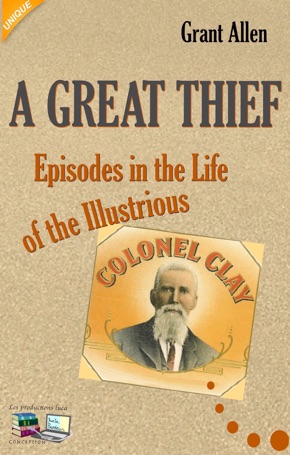THE GERMAN PROFESSOR
That winter in town my respected brother-in-law had little time on his hands to bother himself about trifles like Colonel Clay. A thunderclap burst upon him. He saw his chief interest in South Africa threatened by a serious, an unexpected, and a crushing danger.
Charles does a little in gold, and a little in land; but his principal operations have always lain in the direction of diamonds. Only once in my life, indeed, have I seen him pay the slightest attention to poetry, and that was when I happened one day to recite the lines:
Full many a gem of purest ray serene
The dark, unfathomed caves of ocean bear.
He rubbed his hands at once and murmured enthusiastically, "I never thought of that. We might get up an Atlantic Exploration Syndicate, Limited." So attached is he to diamonds.
You may gather, therefore, what a shock it was to that gigantic brain to learn that science was rapidly reaching a point where his favourite gems might become all at once a mere drug in the market. Depreciation is the one bugbear that perpetually torments Sir Charles's soul; that winter he stood within measurable distance of so appalling a calamity.
It happened after this manner.
We were strolling along Piccadilly towards Charles's club one afternoon, he is a prominent member of the Croesus, in Pall Mall, when, near Burlington House, whom should we happen to knock up against but Sir Adolphus Cordery, the famous mineralogist, and leading spirit of the Royal Society!
He nodded to us pleasantly. "Halloa, Vandrift," he cried, in his peculiarly loud and piercing voice; "you're the very man I wanted to meet today. Good morning, Wentworth. Well, how about diamonds now, Sir Gorgius? You'll have to sing small. It's all up with you Midases. Heard about this marvellous new discovery of Schleiermacher's? It's calculated to make you diamond kings squirm like an eel in a frying-pan."
I could see Charles wriggle inside his clothes. He was most uncomfortable. That a man like Cordery should say such things, in so loud a voice, on no matter how little foundation, openly in Piccadilly, was enough in itself to make a sensitive barometer such as Cloetedorp Golcondas go down a point or two.
"Hush, hush!" Charles said solemnly, in that awed tone of voice which he always assumes when Money is blasphemed against. "Please don't talk quite so loud! All London can hear you."
Sir Adolphus ran his arm through Charles's most amicably. There’s nothing Charles hates like having his arm taken.
"Come along with me to the Athenæum," he went on, in the same stentorian voice, "and I'll tell you all about it. Most interesting discovery. Makes diamonds cheap as dirt. Calculated to supersede South Africa altogether."
Charles allowed himself to be dragged along. There was nothing else possible. Sir Adolphus continued, in a somewhat lower key, induced upon him by Charles's mute look of protest. It was a disquieting story. He told it with gleeful unction.
It seems that Professor Schleiermacher, of Jena, "the greatest living authority on the chemistry of gems," he said, had lately invented, or claimed to have invented, a system for artificially producing diamonds, which had yielded most surprising and unexceptionable results.
Charles's lip curled slightly. "Oh, I know the sort of thing," he said. "I've heard of it before. Very inferior stones, quite small and worthless, produced at immense cost, and even then not worth looking at. I'm an old bird, you know, Cordery; not to be caught with chaff. Tell me a better one!"
Sir Adolphus produced a small cut gem from his pocket. "How's that for the first water?" he inquired, passing it across, with a broad smile, to the sceptic. "Made under my own eyes, and quite inexpensively!"
Charles examined it close, stopping short against the railings in St. James's Square to look at it with his pocket-lens. There was no denying the truth. It was a capital small gem of the finest quality.
...




